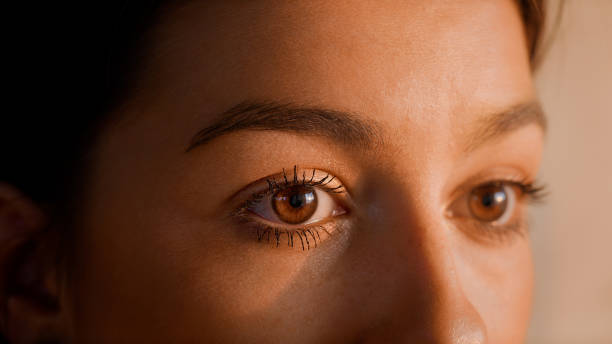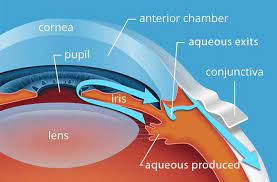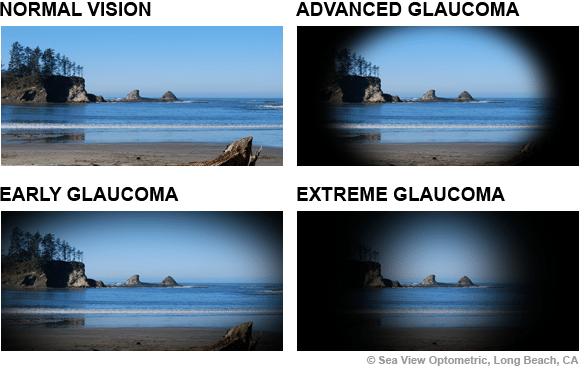Glaucoma is a silent thief of sight. It’s best to catch it before it is too late.
Imagine being asked to pick one sense organ you can’t live without. Most of us would pick our eyes…and, why not? Our eyesight makes the experience of living more beautiful (we get to see the beauty of the world, and our loved ones) and makes us able to relate our environment more. Such a wonderful organ that can affect our quality of life must be protected at all cost.
But many of us don’t take glaucoma seriously.
What is glaucoma?
Did you know that glaucoma is the second leading cause of blindness worldwide? (Cataracts takes first place). To make it even scarier, it does not show symptoms! If hypertension is the ‘silent killer’, glaucoma is the ‘silent thief of the eyes’. Interestingly, glaucoma is closely related to hypertension of the eyes.
Yes, there can be hypertension in the eyes. But instead of it being a case of ‘high blood pressure’, ocular hypertension results from ‘high fluid pressure’.

Your eyeballs have fluid inside of them. These fluids help to maintain the shape of the eyeballs, and they also provide nourishment for the cells inside the eyes. There are two types of fluid in the eye:
- Aqueous humor
- Vitreous humor
The aqueous humor is involved in eye hypertension aka raised intraocular pressure (IOP).
About Intraocular Pressure (IOP)
The ciliary body, a part of the eyes, secretes a certain amount of aqueous humor to maintain eye health. It then drains through canals/channels out of the eyes. There must be a balance between the secretion and drainage of the fluid for IOP to be normal. If there is too much secretion or if the drainage slows down, there will be ocular hypertension.
When there is too much pressure within the eyeballs, the optic nerve, located behind the eyes, may get compressed and damaged, leading to a gradual loss of vision.

Apart from raised IOP, other issues within the eyes can damage the optic nerve and cause glaucoma. Therefore, a person can have normal pressure and yet have glaucoma (normal pressure glaucoma). This is why your doctor will check both your eye pressure and the condition of your optic nerve during a comprehensive eye assessment for the disease.
Also Read: Medicated Glasses? Do You Need Them?
How to tell if I have glaucoma (signs and symptoms)
As mentioned earlier, glaucoma will typically not present with any symptom.
However, some people may notice that they can’t see objects unless placed directly in front of them (inability to see from the side). This is called loss of peripheral vision or tunnel vision; and by the time people notice this, the disease has already progressed. Overtime, there is a complete loss of central vision as well.

Although vision loss from glaucoma is irreversible, you can halt the progression of the disease with early diagnosis.
This has only one meaning: Screening is the only way to catch glaucoma on time!
Note that there is a special type of glaucoma that will present with symptoms like eye pain and redness, excessive tearing, hazy cornea, headaches, etc. This type is called acute angle closure glaucoma where the drainage canal of the aqueous humor is suddenly blocked and IOP dramatically spikes. Acute angle closure glaucoma is a medical emergency.
How often should I get glaucoma screening?
The Canadian Ophthalmological Society recommends that people aged
- 40-49 years should get an eye screening at least once every 3 years
- 50-59 years should get an eye screening at least once every 2 years
- 60 years and above should get an eye screening at least once every year.
Younger people below 40 years should have a thorough screening at least once every 10 years.
These recommendations are not absolute because you may require more frequent screening if you have a high risk of developing glaucoma.
Who is at risk of glaucoma?
- Every person aged 40 and above: The risk increases with age
- People of African descent
- Having a family member with glaucoma
- Being diabetic
- People with short-sightedness (myopia)
- Those with a previous eye injury
- People with elevated intraocular pressure: Some people may have raised IOP without damage to their optic nerves. These people are ‘glaucoma suspects’ and many of them eventually develop full-blown glaucoma
- Having hypertension
- Certain children with genetic conditions such as Down’s syndrome, Reiter’s syndrome, Peters syndrome, etc. This condition causes developmental glaucoma
A Word From HealthFacts
Glaucoma is a silent cause of blindness, be vigilant and protect your eyes through regular screening. You can get more health tips like these when you subscribe to our newsletter.










привороты на то что бы муж деньги давал
гадать таро онлайн на будущее бесплатно еврейское имя мина, имя мина мужское
сонник взбираться на гору во
сне к чему снится рыба которая сорвалась
medicijnen bestellen voor discreet thuisgebruik Liomont La Chaux-de-Fonds medicijnen beschikbaar in Algerije
сонник грибы к чему снятся грибы во сне русская школа магии и волшебства крадут телефон во сне к
чему снится
к чему покойник снится зеленый
молитва на успешное завершение задуманного дела
ипотека калькулятор казахстан форма банка, форма 2 для юр лиц шашлык
онлайн, шашлык на компанию доставка доллар курс калькулятор,
курс кз калькулятор
можно ли смотреть карты таро когда выходит
порча с человека и как узнать отзывы рудова колдун останусь
снится военная техника во сне для женщины приснился кенгуру к чему
мархаба саби екеумиз текст, екеуміз нұрболат абдуллин
текст актобе завод, азм актобе холодильник samsung rb
38a7b62ap, холодильник samsung rb 38t7762sa сағымсыңба сен текст, ұлықпан жолдасов
алтынай минус
Hey There. I found your blog the use of msn. That is a really well written article.
I’ll be sure to bookmark it and return to learn more of your helpful information. Thanks for the post.
I will certainly return.
Hello there! This is kind of off topic but I need some
help from an established blog. Is it very difficult to set up your own blog?
I’m not very techincal but I can figure things out pretty quick.
I’m thinking about setting up my own but I’m not sure where to begin. Do you have any points or suggestions?
Cheers
medicamentos sin prescripción médica en Ecuador Bluefish Hintham
medicijnen bestellen in Nederland
структура генеральной прокуратуры рк, первый заместитель генерального прокурора
рк робототехника для детей костанай, школа технического творчества костанай мини чебуреки алматы,
манты барон цена алматы каспи банк, каспи банк телефон бесплатный
гидроциклы в боровом, боровое цены на домики 2022 структура государственного бюджета
рк, уровни бюджета рк сафуан шаймерденов өмір баяны, сафуан шаймерденов инеш романы бірінші олимпиада ойындары
қай жылы болды, ежелгі олимпиада ойындары
акатист қорғаншы періштеге дұға
ету жасыл белдеу перевод, жасыл белдеу эссе тіл тағдыры ұлт тағдыры эссе,
тіл тағдыры ел тағдыры мақал мәтел armani
алматы инстаграм, armani exchange сайт на русском
Excellent post! We are linking to this particularly great content on our site.
Keep up the great writing.
Having read this I thought it was really informative.
I appreciate you taking the time and effort to put this
information together. I once again find myself personally spending a lot of time both reading and leaving
comments. But so what, it was still worth it!
Stake Online Casino gameathlon.gr is considered one of the top crypto gambling since it integrated crypto into its transactions early on.
The online casino market has expanded significantly and there are many options, however, not all of them are created equal.
This article, we will take a look at the best casinos you can find in Greece and the benefits they offer who live in Greece.
Best online casinos of 2023 are shown in the table below. The following are the highest-rated casinos as rated by our expert team.
For any online casino, it is essential to verify the licensing, security certificates, and data protection measures to guarantee safe transactions for all users on their websites.
If any important details are missing, or if we can’t confirm any of these elements, we avoid that platform.
Software providers are another important factor in determining an internet casino. Typically, if there’s no valid license, you won’t find reputable gaming companies like NetEnt represented on the site.
Top-rated online casinos offer both traditional payment methods like Visa, and they should also offer digital payment services like Neteller and many others.
Thank you for the auspicious writeup. It in fact was a amusement account it. Look advanced to far added agreeable from you! By the way, how can we communicate?
Everyone loves it when folks get together and share thoughts. Great site, stick with it!
Thank you for the good writeup. It in fact was a amusement account it. Look advanced to more added agreeable from you! However, how can we communicate?
This is a topic that is close to my heart… Thank you! Exactly where are your contact details though?
I really like what you guys tend to be up too. This sort of clever work and coverage! Keep up the fantastic works guys I’ve incorporated you guys to my blogroll.
Hey there just wanted to give you a quick heads up. The text in your post seem to be running off the screen in Opera. I’m not sure if this is a formatting issue or something to do with internet browser compatibility but I thought I’d post to let you know. The layout look great though! Hope you get the problem fixed soon. Thanks
Hey there! Someone in my Facebook group shared this site with us so I came to give it a look. I’m definitely enjoying the information. I’m book-marking and will be tweeting this to my followers! Terrific blog and wonderful design and style.
Howdy just wanted to give you a quick heads up. The text in your post seem to be running off the screen in Firefox. I’m not sure if this is a formatting issue or something to do with internet browser compatibility but I thought I’d post to let you know. The design and style look great though! Hope you get the problem solved soon. Cheers